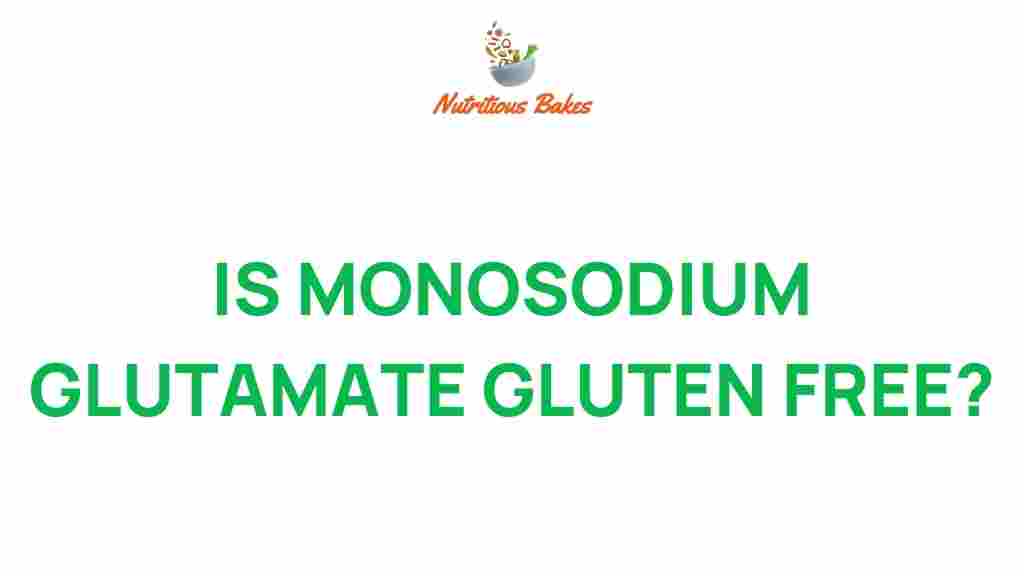Is Monosodium Glutamate Gluten-Free? Uncovering the Truth
In recent years, food additives have become a hot topic among health-conscious individuals and those with dietary restrictions. One such additive, monosodium glutamate (MSG), has faced its share of scrutiny. As a widely used flavor enhancer, many people wonder: Is monosodium glutamate gluten-free? This article will explore the relationship between monosodium glutamate and gluten, address common health myths surrounding MSG, and provide helpful cooking tips for those concerned about food safety and dietary needs.
Understanding Monosodium Glutamate (MSG)
Monosodium glutamate, commonly known as MSG, is a sodium salt of glutamic acid, an amino acid naturally found in various foods. It is often used in cooking to enhance the umami flavor, making dishes more savory and appealing. MSG is prevalent in processed foods, snacks, and restaurant meals, leading many to question its safety and nutritional value.
Before diving into whether MSG is gluten-free, it’s essential to understand its composition and how it fits into a balanced diet. Here are some nutrition facts about monosodium glutamate:
- Caloric Content: MSG contains virtually no calories.
- Sodium Content: It has a sodium content of about 12% by weight, which is significant for those monitoring their salt intake.
- Natural Origins: MSG can be derived from natural sources, such as seaweed, although it is often produced through fermentation processes.
Is Monosodium Glutamate Gluten-Free?
To answer the question directly: yes, monosodium glutamate is gluten-free. The compound itself does not contain gluten, which is a protein found in wheat, barley, and rye. For those with celiac disease or gluten sensitivity, incorporating monosodium glutamate into their diets poses no risk related to gluten exposure.
However, it’s essential to consider the context in which MSG is used. Many processed foods containing MSG may also include gluten-containing ingredients. Therefore, when consuming products with monosodium glutamate, it’s vital to read labels carefully to ensure they are certified gluten-free.
Common Dietary Concerns Related to MSG
Despite its gluten-free status, MSG has been the subject of various dietary concerns and health myths. Below, we address some of these issues:
- Chinese Restaurant Syndrome: This term refers to a collection of symptoms some people claim to experience after consuming MSG. However, scientific studies have largely discredited this theory, suggesting that only a small percentage of individuals may be sensitive to high doses of MSG.
- Allergic Reactions: Allergies to monosodium glutamate are rare. Most people can consume it without any adverse effects. If you suspect an allergy, consult with a healthcare professional.
- Impact on Health: Some health advocates argue that MSG may contribute to obesity and other health issues. Yet, research has not conclusively proven a direct link between MSG consumption and negative health outcomes when consumed in moderation.
Food Safety and MSG
When considering food safety, it’s crucial to know where your food additives come from. Here are some tips to ensure you’re using monosodium glutamate safely:
- Check Labels: Always read ingredient labels to confirm that the product is gluten-free and does not contain other unwanted additives.
- Choose Quality Brands: Opt for trusted brands that clearly label their products, ensuring they meet safety standards.
- Be Mindful of Portion Sizes: While MSG is safe in moderation, excessive consumption of any food additive can lead to health concerns.
Cooking Tips for Using Monosodium Glutamate
Incorporating monosodium glutamate into your cooking can enhance flavors significantly. Here are some practical tips:
- Start Small: Use a small amount of MSG (about 1/2 teaspoon per dish) to enhance flavors without overwhelming the palate.
- Combine with Seasonings: MSG works well with other spices and herbs, enhancing the overall taste of your meals.
- Use in Broths and Soups: MSG can elevate the flavors in broths, soups, and sauces, making them richer and more savory.
- Mix Evenly: Ensure that MSG is mixed well with other ingredients to distribute its flavor-enhancing properties evenly.
Frequently Asked Questions About Monosodium Glutamate
Here are some common questions and answers regarding monosodium glutamate:
- Can I use MSG if I have celiac disease? Yes, MSG is gluten-free and safe for individuals with celiac disease, provided no gluten-containing ingredients are present in the overall dish.
- Is MSG natural or artificial? MSG can be derived from natural sources like seaweed; however, most commercially available MSG is produced through fermentation, which some may consider artificial.
- Does MSG contain any nutritional benefits? While MSG enhances flavor, it does not provide significant nutritional benefits. It is primarily used as a flavor enhancer rather than a nutritional additive.
Conclusion
In summary, monosodium glutamate is indeed gluten-free and can be safely included in the diets of those who need to avoid gluten. While there are numerous health myths surrounding MSG, scientific evidence supports its safety when consumed in moderation. Understanding food additives like monosodium glutamate is crucial for making informed dietary choices.
If you’re interested in exploring more about food additives and their effects on nutrition, consider checking out resources from reputable health organizations. For further reading on gluten-free diets, visit this informative article.
Remember, the key to a healthy diet is balance and moderation. Enjoy experimenting with flavors in your cooking while being mindful of your dietary concerns!
This article is in the category Ingredients and created by NutritiousBakes Team
